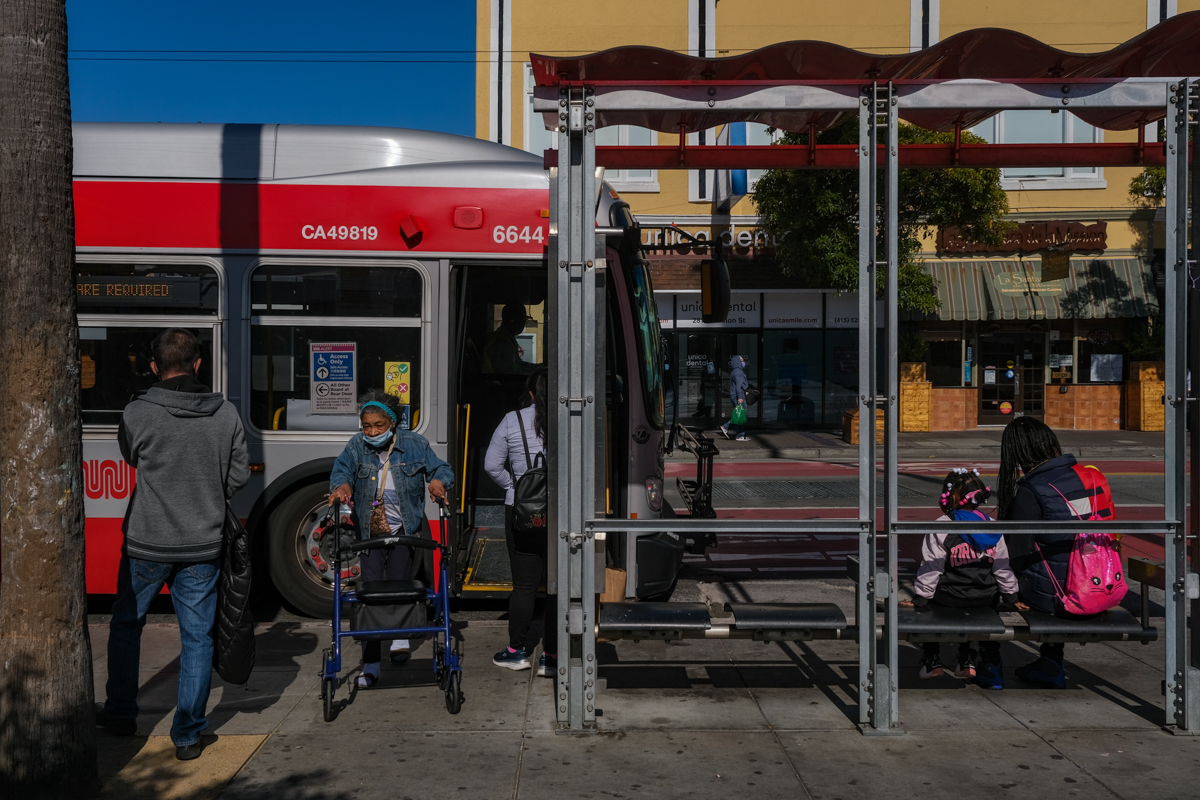A transit plan unveiled this week would expand and restore some Muni lines as early as February 2022 if approved by the Muni board early next month, though uncertainty remains around the exact timing of the service restoration.
The plan, presented to the Board of Supervisors Government Audit and Oversight Committee on Thursday, focuses on restoring key neighborhood connections and access for seniors and people with disabilities but stops short of restoring full pre-pandemic service. The committee voted to continue reviewing the plan before it goes in front of the SFMTA board for approval on Dec. 7.
The biggest barrier to restoring full service is staffing, said SFMTA director of transit Julie Kirschbaum at Thursday’s meeting. While Muni is aiming to implement the proposed changes by February, Kirschbaum said the timeline may be delayed depending on hiring and staff retention. At current hiring rates, she said, Muni may be able to restore service to 100% capacity by the fall of 2022 if the agency is able to secure additional funding.
“At the end of the day, we are in support of full restoration of service to the extent that we can staff it and make sure that it is reliable and make sure that it is good,” said Gwyneth Borden, chair of the SFMTA board of directors.
SFMTA faces a structural deficit that was exacerbated by a steep drop in transit revenues during the pandemic. The agency presented three budget scenarios based on how quickly downtown trips—which made up a lion’s share of daily trips before the pandemic—may recover. In the best care scenario, in which commutes recover to 75% of pre-pandemic capacity and other revenues improve, SFMTA expects to carry a deficit of $46.1 million in fiscal 2026.
The agency expects to receive $288.2 million in federal funds under the American Rescue Plan Act, in addition to the $373.8 million it received from prior stimulus bills. But it has already exhausted half the funds, and says it must balance restoring service with a need to conserve remaining funds and balance its budget.
But union leaders disputed that approach, saying Muni staff are already able to handle a full restoration of service.
Roger Marenco, president of Transport Workers Union of America Local 250A, said the agency has enough operators to restore service to pre-pandemic levels, and said operators feel excluded from the planning process.
“We feel that the agency is playing squid games in terms of pitting neighborhoods against neighborhoods, fighting for which lines should survive and which lines we should kill,” Marenco said. “We are not in support of that.”
In an email, SFMTA spokesperson Erica Kato said that Muni is “experiencing daily open shifts, despite maximizing use of operator overtime.”
“The Transit Division’s vacancy rate has been at 10% or higher since fiscal year 2019, most recently spiking to 24%,” Kato added.
Muni is now running at 75% capacity, with ridership back up to half of pre-pandemic levels and up to 80% on weekends, according to the agency. But six routes remain offline, and others are still truncated or operating less frequently.
SFMTA’s plan would fully restore the 6 Haight/Parnassus, the 8AX/BX Bayshore, the 23 Monterey, the 28R 19th Avenue Rapid and the 43 Masonic. The 3-Jackson and 47-Van Ness are not slated to return. Still to be decided is the future of the J-Church as Muni leaders seek to reduce traffic and delays in subway tunnels and the alignment of the 48-Quintara/24th Street line. Other key lines are set to increase in frequency or be extended with the goal of restoring pre-pandemic service levels within three blocks of all Muni stops.
Kirschbaum said Muni’s current staffing shortage is exacerbated in part by the 98 employees who were placed on leave for a lack of compliance with the city’s COVID-19 vaccination mandate.
Those shortages, in addition to 110 operators who are either seeking exemptions or are out of compliance, have resulted in as many as 140 missed shifts per day during the month of October, according to Kirschbaum. She said if fewer operators ultimately return to work than expected, staffing shortages may severely affect future service restoration plans.
SFMTA is working with the city’s budget office to identify future revenue sources, and has 38 operators in training who can help backfill any operators who are let go.
“We don’t want to be in a situation where newly hired staff would have to be terminated because of a funding shortfall,” Kirschbaum said.
